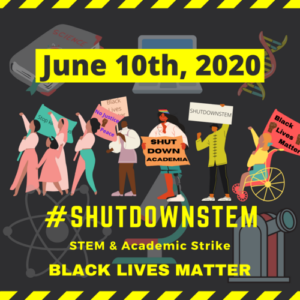#ShutDownSTEM

www.shutdownstem.com
On June 10, 2020, we will #ShutDownAcademia, #ShutDownSTEM, and #Strike4BlackLives.
#ShutDownSTEM is, as explained on shutdownstem.com, “an initiative from a multi-identity, intersectional coalition of STEM professionals and academics taking action for Black lives.” STEM researchers, students, leaders, and support teams are encouraged to use the day to engage in the fight for equity, inclusion, diversity, and the fair and equal treatment of marginalized communities.
Many Science units have developed programming to allow their community to learn, discuss, and take action to confront longstanding systemic racism in our fields and in our lives. These events build on—and would not be possible without—the long history of Black activism, scholarship, and leadership in the fight for Black lives. The goal for tomorrow is “to enable education, action, and healing on racism and other forms of injustice” by learning, taking action, reflecting, healing, and resting, and generally using the time to consider appropriate plans forward to enact necessary change.
We all have a responsibility to listen to and to support members of the Black community within MIT and beyond, to acknowledge and to reflect on our own accountability, and to continue to work together to improve equity in academia and STEM.
Where possible, we hope STEM researchers, students, leaders and support teams join us to #ShutDownSTEM, #ShutDownAcademia and #Strike4BlackLives. Note: “#ShutDownSTEM is aimed at the broad research community who is not directly participating in ending the global pandemic, COVID-19.”
Learn more about #ShutDownSTEM here: https://www.shutdownstem.com/ and follow #ShutDownSTEM on social media, including our Facebook and Twitter.
How the School of Science community and MIT are participating in #ShutDownSTEM:
Note: This is an incomplete list and in flux, updated as events are organized.
- The MIT Daily newsletter will not be sent.
- Institute meetings are cancelled where possible.
- Members of the Biology and Chemistry Departments are planning a day of discussions.
- The Math Department is organizing readings and reflections that afternoon, followed by discussion groups led by members of the department.
- The Department of Earth, Atmospheric, and Planetary Sciences is also sharing readings and hosting discussions in an open forum.
- The Brain and Cognitive Sciences, McGovern Institute and Picower Institute are pressing pause on “business as usual” to allow for self-directed and lab/group discussions.
- The Physics Department is planning on an actual shutdown with no meetings.
- MIT Kavli Institute will host a town hall.
- The Center for Theoretical Physics (CTP) within the Laboratory for Nuclear Science is organizing activities.
- The School of Science welcomes thoughts, comments, suggestions, and feedback for events that we can organize, such as Learn@Lunch gatherings, and how we can enact positive change within our community via scncinfo@mit.edu
- The School of Science is seeking proposals for our Quality of Life grant program. Some activities you may want to consider include: wellness and support resources, ally and inclusivity workshops, book clubs focused on resource materials such as those listed here: https://www.shutdownstem.com/resources, streaming events, and group discussions.
Two members of CTP, Professors Tracy Slatyer and Daniel Harlow, are co-authors on the call to strike, which you can find here: https://www.particlesforjustice.org/strike-details.
Resources:
(An incomplete list; we welcome suggestions at scncinfo@mit.edu)